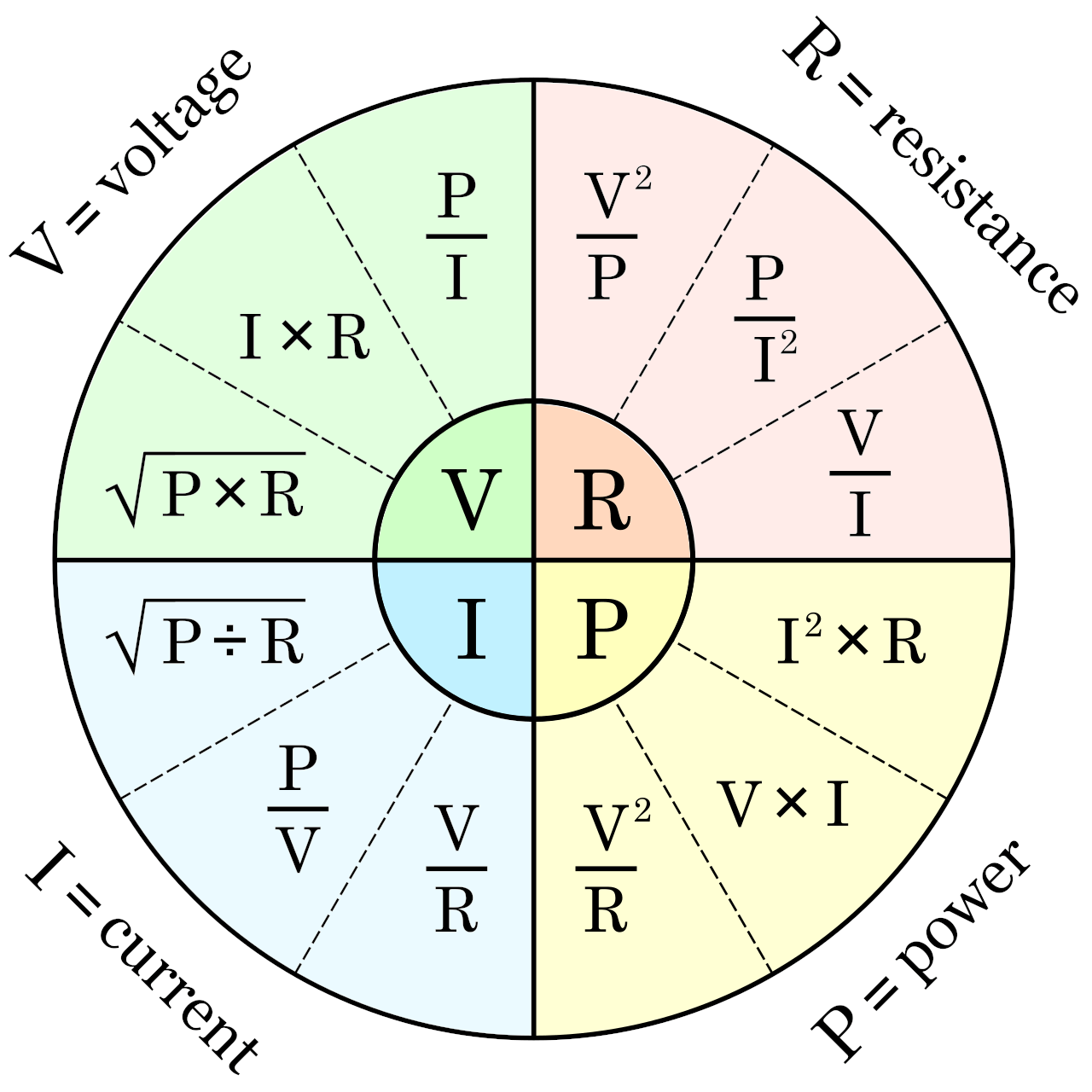Ohms Law Pie Chart
Ohms Law Pie Chart - The wheel below is a handy tool and memory jogger. The combination of ohm's law and joule's law gives us 12 formulas where 2 of the 4 variables are known. Energy = voltage × charge. The basic formulas for ohm’s law are summarised in the below ohm’s law pie chart. This pie chart (wheel) modified for ac circuits illustrates relationships between various quantities in linear networks with a sinusoidal input. E means also energy, so let's choose v. It shows all of the formulas created from the ohm’s law and pir triangles.
V comes from voltage and e from electromotive force emf. Some like better to stick to e instead to v, so. The wheel below is a handy tool and memory jogger. E means also energy, so let's choose v.
So i want to present how i have figured out how to remember the entire ohms law pie chart in a simple way. You can use the formula wheel to calculate values such as voltage, current, resistance, and power. V comes from voltage and e from electromotive force emf. The combination of ohm's law and joule's law gives us 12 formulas where 2 of the 4 variables are known. Ohm’s law states that the potential difference (voltage) between two points is proportional to the current flowing through a resistor, and also proportional to the resistance of the circuit. The basic formulas for ohm’s law are summarised in the below ohm’s law pie chart.
Ohm’s law states that the potential difference (voltage) between two points is proportional to the current flowing through a resistor, and also proportional to the resistance of the circuit. In this video, we look at the 12 math equations on the ohms law wheel and show you how you can easily remember every formula on the wheel. Energy = voltage × charge. The basic formulas for ohm’s law are summarised in the below ohm’s law pie chart. The wheel below is a handy tool and memory jogger.
This pie chart (wheel) modified for ac circuits illustrates relationships between various quantities in linear networks with a sinusoidal input. ”the amount of current flowing in a circuit made up of pure resistances is directly proportional to the electromotive forces impressed on the circuit and inversely proportional to the total. Below is a chart containing the formulas related to ohm’s law. Ohm’s law states that the potential difference (voltage) between two points is proportional to the current flowing through a resistor, and also proportional to the resistance of the circuit.
V Comes From Voltage And E From Electromotive Force Emf.
”the amount of current flowing in a circuit made up of pure resistances is directly proportional to the electromotive forces impressed on the circuit and inversely proportional to the total. This pie chart (wheel) modified for ac circuits illustrates relationships between various quantities in linear networks with a sinusoidal input. The combination of ohm's law and joule's law gives us 12 formulas where 2 of the 4 variables are known. It is correctly represented with an e, since the scientific reference to voltage is electromotive force.
Energy = Voltage × Charge.
E means also energy, so let's choose v. You can use the formula wheel to calculate values such as voltage, current, resistance, and power. I would like some feedback to simplify it further, or poke holes in it,. So i want to present how i have figured out how to remember the entire ohms law pie chart in a simple way.
These Formulas Are Adaptations Of Ohm's Law And.
The basic formulas for ohm’s law are summarised in the below ohm’s law pie chart. To use the chart, from the center circle, select the value you need to find, i (amps), r (ohms), e (volts) or p (watts). It shows all of the formulas created from the ohm’s law and pir triangles. Below is a chart containing the formulas related to ohm’s law.
In This Video, We Look At The 12 Math Equations On The Ohms Law Wheel And Show You How You Can Easily Remember Every Formula On The Wheel.
Ohm’s law states that the potential difference (voltage) between two points is proportional to the current flowing through a resistor, and also proportional to the resistance of the circuit. Click on a date/time to view the file as it appeared at that time. E = v × q. Some like better to stick to e instead to v, so.
Ohm’s law states that the potential difference (voltage) between two points is proportional to the current flowing through a resistor, and also proportional to the resistance of the circuit. Click on a date/time to view the file as it appeared at that time. You can use the formula wheel to calculate values such as voltage, current, resistance, and power. Below is a chart containing the formulas related to ohm’s law. The wheel below is a handy tool and memory jogger.






